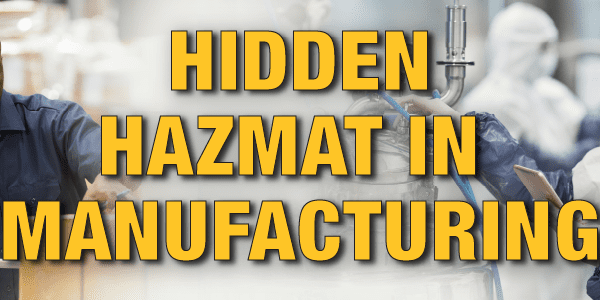The Question
That is a question that we Regulatory Specialists sometimes receive in the form of:
“Do I have to train my employee(s) in TDGR (Canadian Transportation of Dangerous Goods Regulations)/HMR (US Hazardous Materials Regulations) who are only… (serving customers, working the showroom, stock picking, etc., etc.)”.
Short Answer
The short answer to this question, especially over the phone, is: “Maybe.”
Transportation Considerations
Definitions in both sets of regulations are quite broad in addressing what is considered under the jurisdiction of “transportation” when it comes to DG/Hazmat. HMR 49CFR§171.1, 171.8 & 172.700 to 704 and TDGR 6.1(1) & 1.4 (carrier, handling, in transport, offer for transport) deal with this topic in the US and Canada respectively.
Handling, for example, in TDGR “means loading, unloading, packing or unpacking dangerous goods in a means of containment for the purposes of, in the course of or following transportation and includes storing them in the course of transportation. “
Unlike 49CFR, however, the TDGR provides a plethora of special cases (Part 1, 1.15 et al) and special provisions (Schedule 2 as referenced in Schedule 1)- 26 of the former and 32 of the latter at last count- that exempt persons from the Part 6 training requirements (As an aside, this exemption approach seems somewhat ironic- how does a person know how to comply with the conditions of exemption if the person hasn’t been trained?).
Other Considerations
Apart from these exemptions, an employee handling DG/Hazmat, may need to be trained to recognize and/or deal with transportation-labeled products under the requirements of OSHA HazCom or Provincial WHMIS/OHS regulations. This is particularly true for products that may be received with only the transportation labels displayed on outer containers.
Ontario, for example, goes beyond the “WHMIS” regulation by incorporating a general requirement in the Occupational Health & Safety Act (OHSA) itself. ON OHSA section 25 requires, over and above the specific WHMIS regulations that an employer “shall provide information, instruction and supervision to a worker to protect the health or safety of the worker;…(and) acquaint a worker or a person in authority over a worker with any hazard in the work and in the handling, storage, use, disposal and transport of any … chemical …”.
A duly diligent employer will ensure all employees who may encounter hazardous products are trained in the various hazard symbols and pictograms and the implications of the associated classification. Particularly it may be important to provide an indication of when/why certain otherwise hazardous products may be shipped/handled without the need for a training certificate under hazmat/DG regulations.
Conclusion
So: No, you may not have to provide a training certificate under TDGR/HMR; but Yes, you might have to ensure a basic awareness of the TDGR/HMR classes, labeling and the conditions under which exemptions apply.
If you have questions, please contact our regulatory specials here at ICC Compliance Center by calling 1-888-977-4834 (Canada) or 1-888-442-9628 (USA).
Save
Save






 ICC USA
ICC USA ICC Canada
ICC Canada